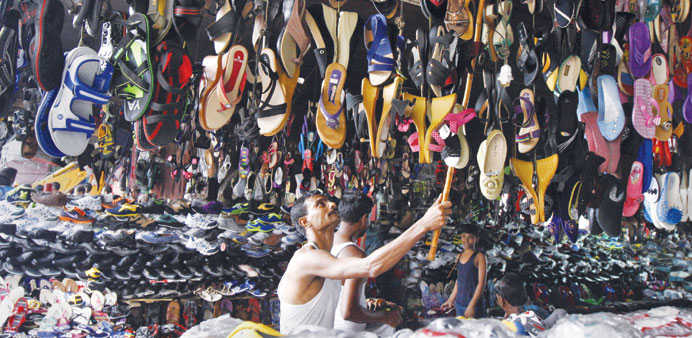A vendor hangs footwear for sale under a flyover at a market in Kolkata. India’s consumer price inflation accelerated 5.4% in June from a year earlier and is forecast to increase towards the central bank’s 6% target by January.
Bloomberg/New Delhi
India’s finance ministry declared that inflation can’t be the primary concern of policymakers on the eve of a rate decision by the central bank.
Declines in commodity and wholesale prices show that inflation isn’t the country’s biggest worry right now, a finance ministry official told reporters in New Delhi on Monday. He asked not to be identified, citing ministry rules.
The comments reflect increased tensions between the finance ministry and central bank over its focus on containing one of Asia’s fastest inflation rates. The ministry released a draft bill last month that would give the government control over a proposed rate-setting committee, putting it at odds with a central bank recommendation.
All but three of 42 economists in a Bloomberg survey expect central bank governor Raghuram Rajan to hold the benchmark interest rate at 7.25% yesterday. The others expect a 25 basis-point cut. Rajan has cut the rate three times this year, easing along with China.
“There is tension because the government is keen to get growth going, and the RBI is not obliging,” said Rajiv Kumar, a former adviser with the finance ministry who also has worked as a principal economist at the Asian Development Bank. “The RBI is inclined to keep the rates as they are because its forecast for CPI is higher.” Investors have started to become less optimistic about Prime Minister Narendra Modi’s ability to jump start India’s economy. The benchmark S&P BSE Sensex has gained 2.5% this year, compared with 30% in 2014.
While Modi’s government agreed to an inflation target of 2-6% earlier this year, the draft bill threatens to water down the proposal. In addition to giving the government majority control of a monetary policy committee, it also calls to review the inflation target every three years.
One point of contention is the use of the consumer price index as the policy anchor. A record divergence with the wholesale price index – at one point the main gauge – has spurred a debate over the central bank’s inflation target, with Modi’s top economic adviser calling for a reassessment.
“The finance ministry has made no bones about their belief that the RBI should cut rates to help stimulate growth,” said Milan Vaishnav, associate in the South Asia Programme at the Carnegie Endowment for International Peace, adding that the new inflation-targeting regime reduces room for Rajan. “If the RBI does not cut rates, the government may be bitter – but it will not come as a surprise.” Consumer price inflation accelerated 5.4% in June from a year earlier and is forecast to increase toward the central bank’s 6% target by January. Wholesale prices fell 2.4%, having declined each month this year. Control of a monetary policy committee is one of the final pieces of Rajan’s plan to modernise the 80-year-old central bank and put it on par with countries such as the US and the UK. He traditionally gives a press conference after each rate decision.

